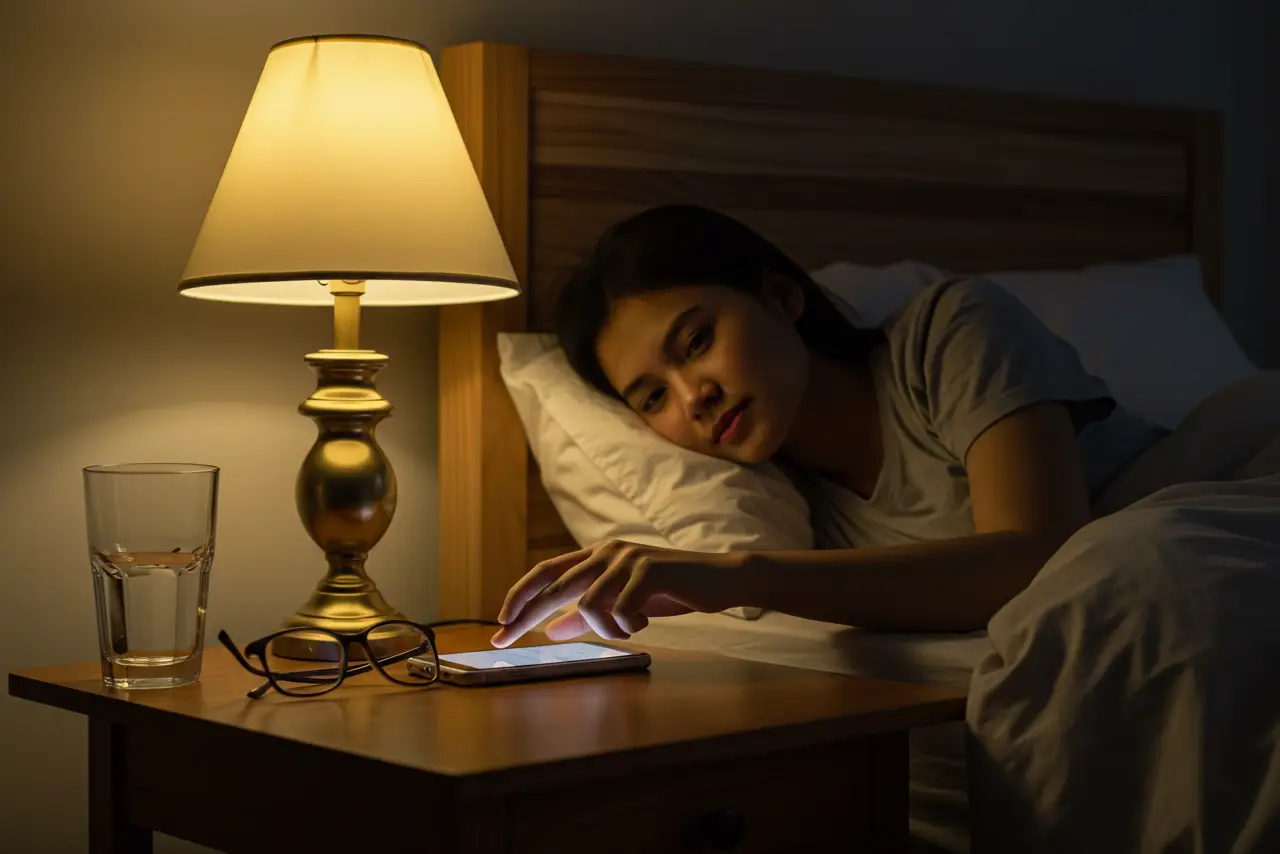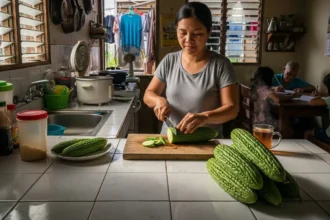If you’re guilty of scrolling Facebook at midnight, binge-watching K-dramas, or working overtime until 2 AM, you’re not alone. Puyat has become a normal part of Pinoy life-so normal that many of us laugh it off, kahit obvious na groggy sa umaga.
But here’s the alarming part: a recent survey revealed that 56% of Filipinos get less than 7 hours of sleep nightly, making us the most sleep-deprived in Southeast Asia. That means more than half of us walk through life tired, cranky, and prone to health risks-all because we can’t (or won’t) prioritize sleep.
Good sleep isn’t a luxury-it’s a necessity. A healthy sleep routine restores your energy, keeps your mind sharp, and protects your body from illness. This guide will walk you through 10 practical “iwas puyat” tips every busy Pinoy can follow-whether you’re a student cramming for exams, a BPO worker on night shifts, or simply someone who can’t put the phone down at night.
| Effect of Puyat | How It Shows in Daily Life | Long-Term Risk |
|---|---|---|
| Pagod at Grogginess | Hirap bumangon, low energy sa work/school | Decreased productivity |
| Mood Swings & Init Ulo | Irritable mornings, away sa pamilya/barkada | Strained relationships |
| Weakened Immune System | Laging sipunin o madaling magkasakit | Chronic illness |
| Weight Gain | Late-night snacking, poor metabolism | Obesity, diabetes |
| Faster Aging | Mukhang laging pagod, eye bags, wrinkles | “Mas tumatanda” hits earlier |
| High BP & Heart Issues | Hypertension, poor circulation | Stroke, heart attack |

😴 How Lack of Sleep Affects Pinoys
Puyat isn’t just about feeling sleepy the next morning-it’s a slow thief of health, energy, and even happiness. For many Filipinos, the effects creep in without us realizing it, until one day we find ourselves asking: “Bakit parang ang tanda ko na?”
🩺 Physical Health Risks
Doctors warn that chronic sleep deprivation raises the risk of weight gain, high blood pressure, diabetes, and a sluggish immune system. Every time you sacrifice sleep, your body loses its chance to repair and reset. That’s why you’re more likely to catch a cold after a week of puyatan or feel drained kahit wala ka namang masyadong ginawa.
In fact, kapuyatan is linked to faster aging. As one local health article joked: “Matanda ka na ba? Baka dahil sa puyat!” Wrinkles, eye bags, and dull skin are just the outward signs of what’s happening inside your body.
🧠 Mental and Emotional Strain
Sleep and mood are deeply connected. Kulang sa tulog? Expect crankiness, mood swings, and poor focus the next day. Many Pinoys notice how lack of sleep makes them masungit in the morning-snapping at kids, getting irritated in traffic, or feeling easily stressed at work. The cycle repeats daily, creating tension at home and sa opisina.
👨👩👧 Family and Social Life
Sleep deprivation doesn’t just affect you-it affects the people around you. Parents who stay up late watching TV or working overtime often wake up without energy to bond with their kids. Workers who bring their grogginess to the office drag down team morale. Even small things like being “mainit ulo” at breakfast can snowball into arguments with your partner or family.
📉 Productivity and Daily Energy
Many Filipinos wear puyat like a badge of honor-“Sanay na ako sa 4 hours lang!”-but the reality is your brain and body are suffering. Studies show that less than 7 hours of sleep consistently lowers concentration, slows reaction time, and reduces productivity. That’s why even if you clock in at work or school, you’re not performing at your best.
💡 In short: puyat makes you sick, short-tempered, and less effective in life. It steals the joy from family moments, the focus from your work, and the glow from your health.

🌃 Common Reasons for Pinoy “Puyat Culture”
Sleep experts say adults need 7–9 hours of rest. Pero tayong mga Pinoy? Madalas kulang, dahil sa ating sariling diskarte (and sometimes excuses). Here are the usual suspects:
📺 Teleserye & K-Drama Binges
How many times have you told yourself “Last episode na ‘to”-only to end up watching three more? From teleseryes to K-dramas, our love for stories keeps us awake until midnight. The problem? The cliffhangers may be good for kilig, but bad for sleep.
📱 TikTok & Facebook Doomscrolling
Admit it-sometimes you plan to check just one post, pero one hour later, you’re still laughing at memes or debating sa comment section. Blue light from phones tricks our brains into thinking it’s still daytime, making it harder to fall asleep.
🎮 Gaming All-Nighters
“Isa pa, isa pa!” Gamers know this well. Whether it’s Mobile Legends, CODM, or online PC games, adrenaline from gaming makes it nearly impossible to wind down. Before you know it, 3 AM na, and may pasok ka pa bukas.
☎️ BPO & Graveyard Shifts
For BPO workers, puyat isn’t always a choice-it’s the nature of the job. Graveyard shifts flip the body clock, making it harder to sleep when the world outside is wide awake. Without careful adjustment, this routine can seriously harm long-term health.
🔥 Mainit na Panahon
Sometimes it’s not Netflix or work keeping you up-it’s the heat! Many Pinoys sleep uncomfortably during hot months, lalo na kung walang aircon. Restless nights lead to shallow sleep and constant waking.
📚 Late-Night Studying or Working
Some of us genuinely prefer the quiet of late nights to study or finish reports. And while it feels productive, this habit cuts deep into your needed rest. Sacrificing sleep for deadlines may get you through today-but will drain you tomorrow.
💡 Bottom line: Whether it’s choice or circumstance, puyat has become a national habit. But just because we’re used to it, doesn’t mean it’s healthy. The good news? We can fight back with practical “Iwas Puyat” tips.
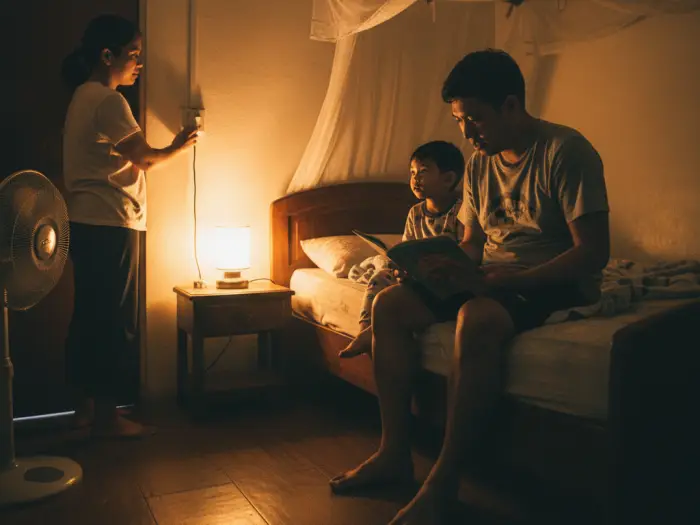
🛏️ 10 “Iwas Puyat” Tips for Better Sleep
Let’s be real: puyat has become part of our kultura. Whether it’s binge-watching teleseryes, grinding in Mobile Legends, or working graveyard shifts, many Pinoys wear sleepless nights like a badge of honor. But the truth is, consistent puyat drains energy, weakens the body, and steals the joy from daily life.
The good news? You don’t need fancy gadgets or expensive treatments to improve sleep. With a few simple changes-like setting a bedtime ritual, cutting down on kape at night, or saying goodbye to late-night doomscrolling-you can start waking up fresh and energized. Here are 10 practical, Pinoy-friendly tips to help you finally say goodbye to puyat.
📊 Quick Reference Table – Sleep Habits vs. Benefits
| Habit (Iwas Puyat Tip) | Why It Works / Benefit |
|---|---|
| 1. Consistent Sleep Schedule | Trains body clock; better quality sleep |
| 2. Bedtime Ritual | Signals the brain it’s time to rest |
| 3. Gadget Curfew | Less blue light = faster, deeper sleep |
| 4. Optimize Sleep Environment | Cooler, darker, quieter room = mahimbing na tulog |
| 5. Comfy Kulambo & Bedding | Prevents distractions (lamok, body aches) |
| 6. Watch Late-Day Diet | Avoids caffeine/acid reflux that ruins sleep |
| 7. Get Moving in the Day | Exercise makes it easier to fall asleep at night |
| 8. Power Naps, Not Long Naps | Recharges without ruining night sleep |
| 9. Manage Stress Before Bed | Calms mind and body; prevents overthinking |
| 10. Seek Professional Help if Needed | Detects real sleep disorders (e.g. apnea) |
🌟 Pinoy-Friendly Sleep Habits
Tip #1: Set a Consistent Sleep Schedule
Sabihin na natin: “Tulog na by 11 PM!” Sleeping and waking up at the same time daily-even on weekends-helps train your body clock. Eventually, you’ll fall asleep faster and wake up fresher without multiple alarms.
Tip #2: Create a Bedtime Ritual
Wind down Filipino style: take a warm maligamgam na paligo, drink a glass of gatas, or read a book before bed. These small rituals signal your body to relax and prepare for deep sleep.
Tip #3: Gadget Curfew
Follow the “no gadgets 1 hour before bed” rule. Bawal muna ang TikTok at Facebook scroll! Blue light from phones tricks the brain into staying alert. Replace screen time with journaling, prayer, or listening to calm OPM music.
Tip #4: Optimize Your Sleep Environment
Make your room cool, dark, and quiet. Use an electric fan or aircon, try blackout curtains, or an eye mask to block street lights. Earplugs help if maingay ang kapitbahay na nagvi-videoke hanggang hatinggabi.
Tip #5: Invest in Comfy Kulambo or Bedding
Walang mas nakakagising kaysa sa lamok! A trusty kulambo keeps them away. Pair it with a good kutson and supportive pillows-your back and neck will thank you. Mahimbing na tulog = mas good mood sa umaga.
Tip #6: Watch Your Late-Day Diet
Iwasan ang kape, milk tea, or energy drinks sa gabi-caffeine lingers in your system for hours. Skip heavy pulutan or midnight “silog meals” that can cause acid reflux. If gutom ka, go for light snacks like saging or crackers.
Tip #7: Get Moving in the Day
Regular exercise improves sleep quality at night. Kahit simpleng 30-minute lakad, barangay Zumba, or basketball with barkada counts. Just avoid intense workouts right before bed, kasi it might energize you instead of relaxing you.
Tip #8: Power Naps, Not Long Naps
Kung talagang antok, take a 20–30 minute nap before 3 PM. Anything longer or later will make it harder to fall asleep at night. Power nap lang, hindi full siesta!
Tip #9: Manage Stress Before Bed
Overthinking keeps many Pinoys awake. Try relaxation routines: deep breathing, gentle stretching, or listening to acoustic/OPM ballads. Keep a notebook by your bed to jot down worries-tell yourself “bahala na bukas.”
Tip #10: Seek Professional Advice if Needed
If puyat is constant kahit sinunod mo na lahat ng tips, baka may underlying condition like insomnia or sleep apnea. Don’t ignore it-consult a doctor or visit a sleep clinic (meron na sa ilang public hospitals in PH). Getting professional help can transform your health.
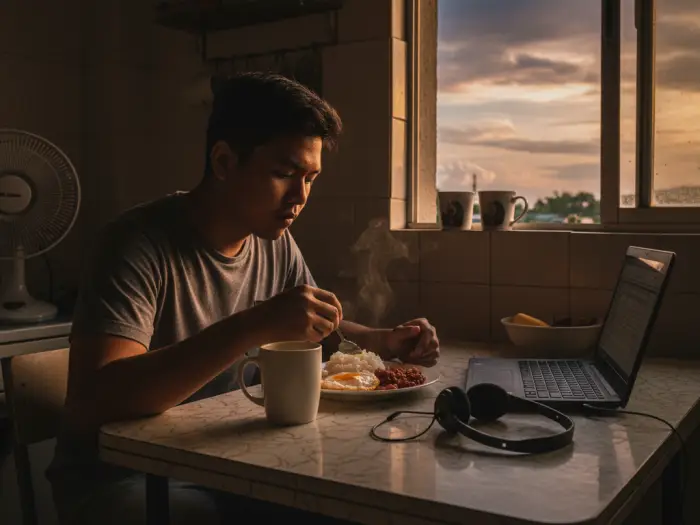
🕰️ Special Situations: Adjusting Your Body Clock
Not all Pinoys have the luxury of a 9-to-5 schedule. Some work when everyone else is asleep, while others are parents adjusting to newborn life. If you’re part of these groups, don’t worry-there are still ways to protect your health and iwas puyat even with an irregular routine.
☎️ For BPO and Night Shift Workers
-
Simulate Nighttime During the Day – Use blackout curtains, eye masks, or even aluminum foil on windows to create a dark room. This helps convince your brain that it’s time to sleep.
-
Block Out Noise – Earplugs or white noise (electric fan hum, phone apps) help drown out daytime ingay from kapitbahay, tricycles, or street vendors.
-
Caffeine Curfew – Limit kape intake to the first half of your shift. Drinking coffee near the end makes it harder to sleep when you get home.
-
Consistent Schedule – As much as possible, sleep and wake up at the same time-even on days off-to keep your body clock stable.
💡 Pro Tip: Don’t rush errands after your shift. Sleep first, then do groceries or chores later. Health before hustle.
👶 For New Parents
-
Sleep When the Baby Sleeps – Forget chores for a while. Those short naps restore your energy.
-
Tag-Team with Your Partner – Take turns during night duty. One parent rests while the other handles baby care.
-
Accept Help – If lola or ate offers to watch the baby for an hour, grab the chance. Use the time for real rest, not endless housework.
-
Keep Night Feedings Low-Key – Dim lights, speak softly, and avoid stimulation so baby (and you) fall back asleep faster.
💡 Pro Tip: Remember, this stage won’t last forever. Give yourself grace-better sleep will return as your child grows.
🎓 For Students and Night Owls
-
Study Smart – Instead of cramming until 3 AM, study in shorter, focused bursts during the day. Use the Pomodoro technique (25 minutes focus, 5 minutes break).
-
Create a Wind-Down Ritual – After studying, don’t expect to sleep right away. Do a calming activity (like journaling or listening to acoustic OPM) to signal your brain it’s bedtime.
-
Avoid All-Nighters – One night of lost sleep can mess with memory retention. You’ll perform better with rest than with puyat.
💡 Pro Tip: Review consistently days before exams instead of one mega-cram session. Mas effective, less stress.
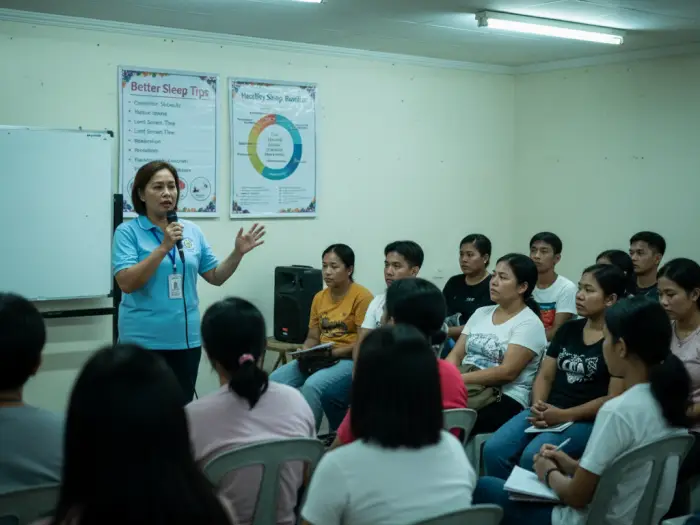
❓ FAQs on “Iwas Puyat” and Better Sleep
Q1: Ilang oras ba talaga ang tamang tulog para sa adults?
Experts recommend 7–9 hours of sleep for adults. Kung laging kulang, your body won’t fully repair itself, leading to low energy and higher health risks.
Q2: Okay lang ba ang “catch-up sleep” tuwing weekends?
Pwede siyang makatulong pansamantala, but it won’t fully reverse weekday sleep debt. Mas effective pa rin ang consistent sleep schedule-even on weekends.
Q3: Totoo bang puyat nakaka-cause ng weight gain?
Yes, studies show sleep deprivation affects hormones that control appetite. Kaya madalas mas crave ka ng junk food or carbs kapag puyat ka.
Q4: Nakakatulong ba ang kape sa gabi para maging productive?
Kape boosts alertness, but drinking it late will mess with your body clock. Mas okay na i-limit ang caffeine sa umaga hanggang early afternoon.
Q5: Anong oras dapat matulog para fresh sa umaga?
Ideally before 11 PM, since your body’s natural repair processes peak during midnight to 3 AM. Sleeping earlier aligns with your circadian rhythm.
Q6: Safe ba ang power naps araw-araw?
Yes, short naps of 20–30 minutes are healthy and refreshing. Pero wag lampas dito, kasi mahihirapan kang makatulog sa gabi.
Q7: Puwede bang magpuyat basta may vitamins naman?
Vitamins support health, pero hindi nila mapapalitan ang restorative power ng tulog. Sleep is irreplaceable-it’s your body’s natural healing time.
Q8: Nakakatulong ba ang exercise kung hirap makatulog?
Yes, regular activity improves sleep quality. Just avoid intense workouts bago matulog kasi baka ma-energize ka pa lalo.
Q9: Totoo bang mas madaling makatulog kapag malamig ang kwarto?
Yes, cooler rooms help your body relax and trigger sleep faster. Kaya maraming Pinoy gumagamit ng electric fan or aircon para sa mahimbing na tulog.
Q10: Kailan dapat magpatingin sa doktor tungkol sa tulog?
If insomnia persists for 2+ weeks or lagi kang gising hanggang madaling araw, it’s best to consult a doctor. Conditions like sleep apnea or chronic insomnia can be treated in sleep clinics.
🌟 Iwas Puyat, Iwas Sakit – Choose Rest, Choose Life
In a country where puyat feels normal-whether from traffic, telenovelas, TikTok, or trabaho-it’s easy to think that sleepless nights are just part of being Filipino. But here’s the truth: puyat is not a badge of honor, it’s a silent thief of health. Each hour of sleep you sacrifice is an hour your body needed to heal, recharge, and prepare you for the challenges of tomorrow.
Good sleep is not a luxury reserved for the rich or those with aircon. It’s something every Juan and Juana deserve. From using a kulambo to ward off lamok, to setting a gadget curfew, to simply saying “sige, bukas na lang”-small, practical steps can lead to big changes in how you feel every day. Imagine waking up without that heavy, groggy feeling. Imagine having the energy to laugh with your kids, perform better at work, and actually enjoy life instead of just dragging yourself through it.
Remember, discipline at night means energy in the morning. The more you prioritize rest, the more present and alive you’ll feel for the people and things that matter most. Tulog isn’t time wasted-it’s the best investment you can make for your health, your happiness, and your future.
So tonight, make that choice: put the phone down, switch off the TV, close your eyes, and allow yourself the gift of true rest. Because when you finally wake up refreshed and recharged, you’ll realize-iwas puyat is iwas sakit, and iwas sakit is more life to live. 🌙✨



